16 Rare Facts About the U.S. Presidency
 A number of myths surround the U.S. presidency. Often times, these develop
out of a lack of understanding and a minimal awareness of history. Over the
course of the United States, numerous presidents have come and gone. Each one
has brought a particular flavor and distinctive approach to politics. However,
certain facts are true, and sometimes the popular stories draw on factual
accounts. Learning about some of the more minute areas of the presidency and the
men who have filled the position, can be both enlightening and entertaining. A number of myths surround the U.S. presidency. Often times, these develop
out of a lack of understanding and a minimal awareness of history. Over the
course of the United States, numerous presidents have come and gone. Each one
has brought a particular flavor and distinctive approach to politics. However,
certain facts are true, and sometimes the popular stories draw on factual
accounts. Learning about some of the more minute areas of the presidency and the
men who have filled the position, can be both enlightening and entertaining.
Here is a list of 16 interesting, yet rare facts of the US presidency.
16) Not All Presidents Were Long Winded
A common myth is that being a president means that you have to be long
winded. In fact, the myth goes so far as to say that all presidents are long
winded and have a passion for speaking at great length. Today, many presidential
speeches tend to last for an hour or more. The average time of a State of the Union speech is between 50-55
minutes long since Lyndon B. Johnson. State of the Union speeches are not the
only long speeches presidents give. There is no direct trend between historical
era and speech length. The longest speech in history delivered by a U.S.
President was William Henry Harrison whose speech totaled 8460 words, and lasted
over an hour.
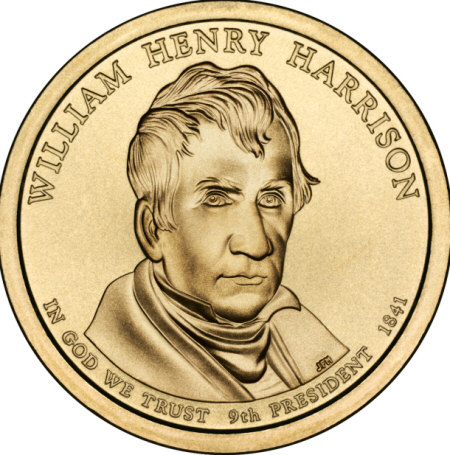
However, not all of our Presidents gave long speeches. George Washington gave
the shortest inaugural speech on record. His speech consisted of 133 words and
lasted under 2 minutes. Abraham Lincoln and his famous Gettysburg Address is
another example of a president delivering short speeches. The Gettysburg Address
is only 10 sentences long, yet it is remembered as being more important than the
battle that inspired it.
15) Not All Presidents Went to College
Another common myth is that all presidents are highly educated and attend the
finest educational facilities of their time. Eight Presidents never went to
college. These Presidents are George Washington, Andrew Jackson, Martin Van
Buren, Zachary Taylor, Millard Fillmore, Abraham Lincoln, Andrew Johnson, and
Grover Cleveland. Many of these Presidents led our nation through wars and were
elected to 2 terms. Van Buren, Fillmore, and Andrew Johnson served as
Vice-Presidents before becoming President.

By Joseph Williams (originally posted to Flickr as Harvard) [CC-BY-2.0],
via Wikimedia Commons
The college that boasts the most Presidential alumni, but with a surprisingly
low number, is Harvard. As it advertises in its history section, Harvard has
seven alumni who have served as president. These presidents include John Adams,
John Quincy Adams, Teddy Roosevelt, Rutherford B. Hayes, John F. Kennedy, and
George W. Bush.
14) Not all Presidents Were Tall and Good Looking
|
Abraham Lincoln:

|
A popular rumor that has made it into numerous chain letters and conspiracy
theories is that to be president, the president must be both tall and good
looking. Some presidents have been elected primarily based on their ability to
win votes through charm and physical appearance, at least if interviews from Fox
News and CNN are to be believed. However, this has not always been the case.
Some presidents were defiantly not elected based on their physical appearance
alone.
Abraham Lincoln, for example, was a gangly 6' 4” man who weighed 180 pounds
when he was elected. James Madison was our nation's shortest and smallest
president. He stood at 5' 4” tall and weighed no more than 100 pounds. William
Howard Taft weighed between 335-340 pounds by the end of his Presidency. He is
also famous for a signature mustache whose style was not publicly appreciated
until Wilfred Brimbly started wearing facial hare similar to Taft's in the late
1980s.
James Madison:

13) The Tradition of the Two Terms Was Created Accidentally
Traditions are one of those things that one might assume were created
intentionally. Not all of the lasting institutions of America were the result of
careful planning. The most important unintentional tradition was the two term
Presidential limit. George Washington was the first President to serve two terms
and then retire, although he could have served more terms if he wanted. Thomas
Jefferson decided to step down after two terms in honor of Washington's example.

The two term limit only became law after F.D.R. served three terms and died at
the beginning of his fourth term. Then the Constitution was amended to impose a
mandated two term limit on Presidents.
12) Some Presidents Had Eventful Careers After Their Presidencies Ended
|
President / Judge Howard Taft:
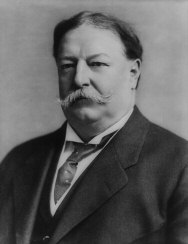
|
Serving as the President is to occupy the highest political and military
position in America. However, there are many Presidents who went on to lead even
better careers after their Presidency than they did while they ran the country.
Howard Taft only ran for political office because he felt obligated to do so.
He really did not want it. After his defeat by Woodrow Wilson in 1912, Taft was
finally able to pursue his dream job as a judge. He was appointed to the U.S.
Supreme Court. He served on the court as Chief Justice until shortly before his
death in 1930. Another example of a president living an even better life after
the presidency is Jimmy Carter. Even though Jimmy Carter left office with a
dismal 34 percent approval rating when he left office, he went on to be quite
actively involved in a number of fulfilling activities. Nevertheless, Jimmy
Carter was a better man than he was a president and politician. Carter was
awarded the Nobel Peace Prize for his political and humanitarian efforts in his
post-presidency years. He became a deacon in his church in Plains, Georgia and
as of 2012, and he still teaches Sunday School there.
Deacon Jimmy Carter:

By Grace (originally posted to flickr as Jimmy Carter) [CC-BY-2.0],
via Wikimedia Commons
11) Some Presidents Served at the Lowest Ranks in the U.S. Military
|
George Washington during French and
Indian War:

|
Thirty-one U.S. Commanders-in-chief have served in the US armed forces in
some capacity. However, that service ranges from the highest military ranks to
the lowest. Most people assume that the president must serve at the highest
position or at least reach that position before he leaves.
Some presidents, such as George Washington and Dwight Eisenhower, served as
six and five star generals, respectively. They are actually part of the reason
that this myth started. Washington served as the General of the Armies of the
United States. The 6-star general rank was only given to one other service
member. John J. Pershing was promoted to a 6-star general in 1919 for his
service during World War I. George Washington was promoted to this rank
posthumously by Gerald R. Ford during his presidency. President Ford then
proclaimed that no other US officer could rise to a higher rank than Washington.
Dwight Eisenhower was also the only President to serve during both world wars
and might have actually received that higher rank had circumstances not
otherwise dictated.
Other Presidents served at the lowest ranks possible. James Buchanan served
as a private in the US Army state militia of Pennsylvania during the war of
1812. He is the only future President to have never served as an officer.
Abraham Lincoln served during the Black Hawk War by burying the dead. He was
initially commissioned as a captain, but was ushered in and out of service. He
finished his tour as part of a spy group and without ever seeing any action or
fighting. Jimmy Carter served on a submarine during the Korean War, but was
never sent. George W. Bush flew in the Air National Guard and logged 332 flight
hours before he left the service in 1972. He did not see actual combat.
10) Some
Presidents Served in Non-Combat Roles When Serving in the Military
Some future Presidents served in non-combat roles without much if any risk of
seeing any fighting or battles when they performed their military duties.
Chester A. Arthur served in the Quartermaster's Corps from 1860-1862. As a part
of that branch, he did not see combat but instead helped supply Union troops
with supplies. Thomas Jefferson rose as high as colonel of the Virginia militia.
He had some militia duties, but primarily performed administrative duties.
Ronald Reagan rose to a captain in the Air Force during World War II, but was
barred from combat duty because of his poor eyesight.
Ronald Reagan - Air Force Captain:

James Madison did not see combat, but served during the Revolutionary War.
There is some debate as to whether he commanded an artillery battalion during a
British attack on Washington during the war of 1812. If he did, then he would be
one of two US Presidents to command troops while in office. The other one was
Washington during the Whiskey Rebellion, which lasted from 1791-1794.
One President, Millard Fillmore, served in the armed forces after he served
as President.
Millard Fillmore:
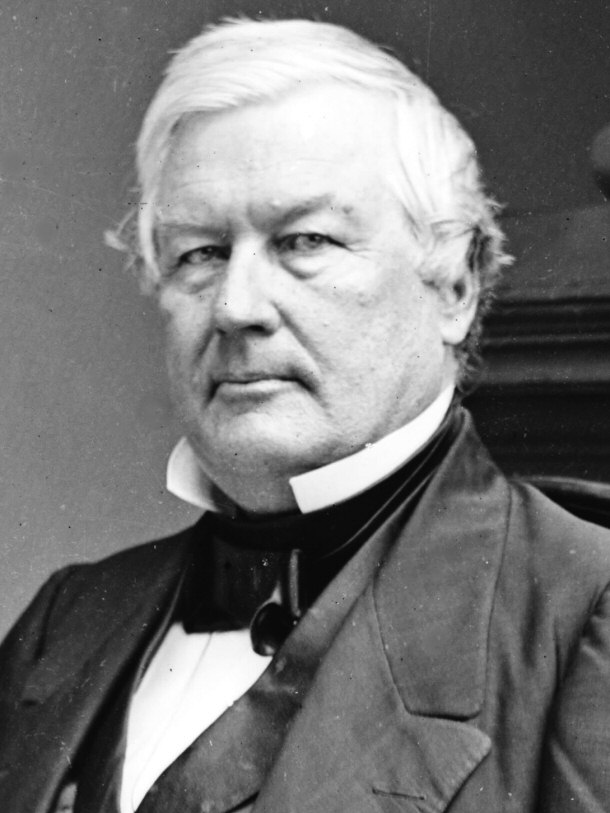
He served during the Mexican-American War and the Civil War in
1861. He served with the home guard and therefore saw limited combat if he saw
any at all. Teddy Roosevelt signed up to serve in World War I after his
presidential defeat in 1912, but President Woodrow Wilson declined his
application.
9) Some Presidents Are Known for Their Eccentric Behavior
|
Goofy President Calvin Coolidge:

|
The definition of eccentric behavior may change depending on the speaker.
Attributing wars to divine intervention and prophecy or making a literary
reference does not count as eccentric. Those types of behaviors are simply
trying to make sense of information or rallying the people that were likely to
understand the reference. Eccentric behavior is odd behavior that has very
little, if any, relation to the normal duties of the President.
President Calvin Coolidge would, from time to time, push all of the buttons
on his desk to summon his staff. He would then hide while the entire staff came
running in. He would soon jump out and surprise his staff. He explained his
actions as a way to check his staff and ensure that they were at the top of
their game. Generally though, the staff did not appreciate this. Another story
says that Coolidge liked his head rubbed with petroleum jelly while he was
eating breakfast in bed. Every member of Teddy Roosevelt's family owned stilts,
including his wife. John Quincy Adams would often skinny dip in the Potomac
River. Thomas Harding once bet an entire set of very expensive White House China
on a hand in poker. He lost the hand, unfortunately, along with the precious
china. Jefferson and Monroe were rumored to never sit down when doing their
deepest, most important work. Supposedly they, along with Benjamin Franklin,
believed that the mind worked best when one was either standing at a desk or
reclining in a tub.
Thomas Jefferson:

8) Many Presidents Regularly Demonstrated a Faith in God, Although Not
Necessarily Following the Dictates of a Particular Denomination
"America's God and Country" by William J. Federer, records a number of
quotations of significant American figures that concern religious topics or
mention God. This book and other sources indicate that a number of presidents
demonstrated a faith in the Christian God, despite not establishing a government
church or following the dictates of a particular denomination. George Washington
has a lot of letters and speeches that show Washington's deep faith in God. From
the depths of apparent defeat at Valley Forge to his victory over Cornwallis at
Yorktown, Washington demonstrated repeated and consistent reliance on and praise
to God for his role in the victory over Britain. Much of this is revealed in his
letters, both to his wife and to other correspondents.
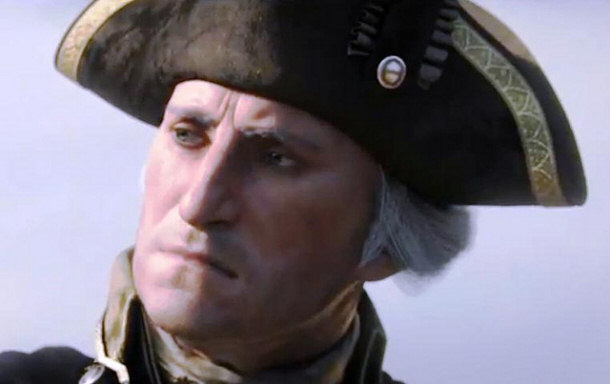
Abraham Lincoln once lamented, “But we have forgotten God. We have forgotten
the gracious Hand which preserved us in peace, and multiplied and enriched and
strengthened us.” This and other quotes indicate not only a familiarity with
God, but a reliance on him.
Thomas Jefferson viewed God as a teacher, according to his letters. God set
the world in motion and gave us the Bible for understanding how to best interact
with creation, including one another. Jefferson is most accurately a Deist,
although his description of himself as “a disciple of the doctrines of Jesus”
may simply indicate that he studied God through Scripture instead of through
prayer like Washington.
7) Presidents Other than Abraham Lincoln and JFK Have Been Assassinated
While in Office
The most infamous assassinations in the United States are those of Abraham
Lincoln and JFK. However, two other presidents were also assassinated while
serving their terms in office. These two presidents were James A. Garfield and
William McKinley.
James A. Garfield was shot on July 2, 1881. He had taken office less than
four months ago. Slipping into the office, Charles J. Guiteau shot him twice.
The shots struck the president in the right arm and in the back. The shots did
not kill him as they were from a .442 Webley British Bulldog revolver. The
subsequent infection and bleeding actually killed him, though it took eleven
agonizing weeks to do so. Guiteau was apprehended, tried, and executed, despite
being found mentally unbalanced.
Death Bed of President Garfield:
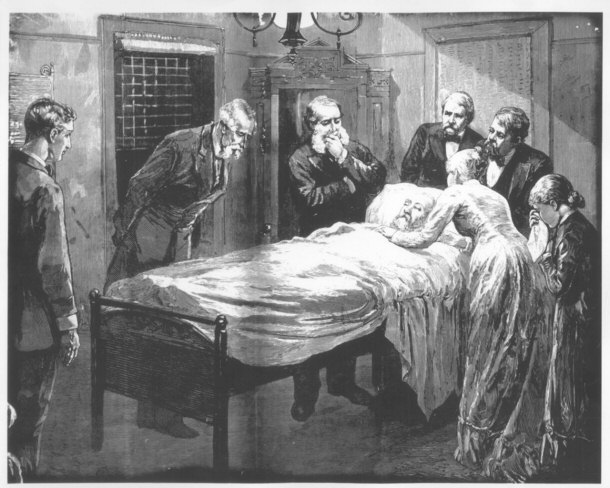
By Otis [CC-BY-2.0],
via Wikimedia Commons
William McKinley was shot on Sept. 6, 1901 while at the Temple of Music in
Buffalo. Here, he was attending the Pan American Exposition. A mad gunman named
Leon Czolgosz, an anarchist, appeared from the crowd and shot him twice in the
abdomen. Though the first bullet bounced off his bullet proof vest, the second
shot found its way through. Like Garfield, McKinley did not die from the shot
initially. He hung on for eight days before dying from the infection. The crowd
at the shooting managed to capture and subdue Czolgosz who paid the highest
penalty for his crimes, executed by electric chair less than two months later.
Leon Czolgosz (below) shot President William McKinley
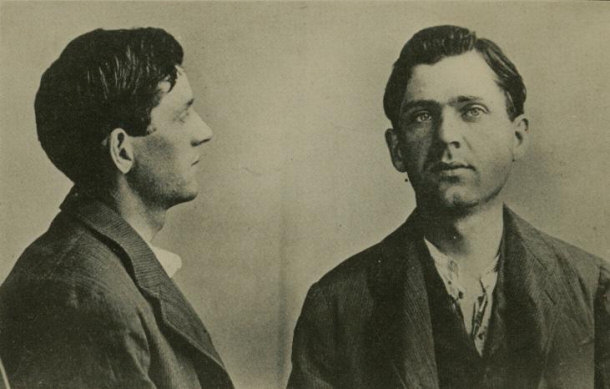
6) A Few Presidents Had Unusual Beliefs
Some presidents have had unusual beliefs and practices. Thomas Jefferson was
convinced that if he soaked his feet in a bucket of cold water every night, he
would never catch a cold. Jimmy Carter was convinced that he saw a UFO and
claimed to believe in aliens.
Carter in Office:
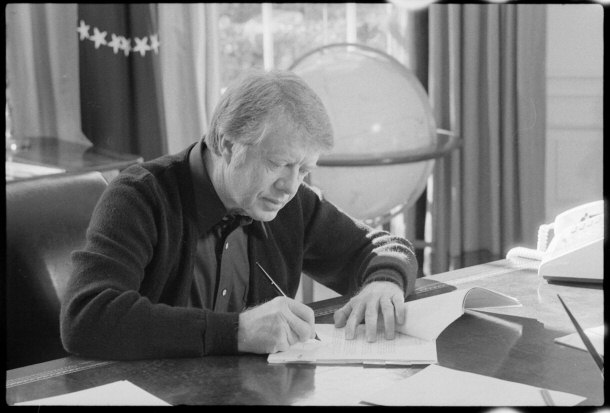
He is actually the only president to go on record
as having seen a UFO. Lyndon B. Johnson had a strange habit of exposing his
private parts during negotiations to demonstrate that he meant business.
Lyndon B. Johnson:
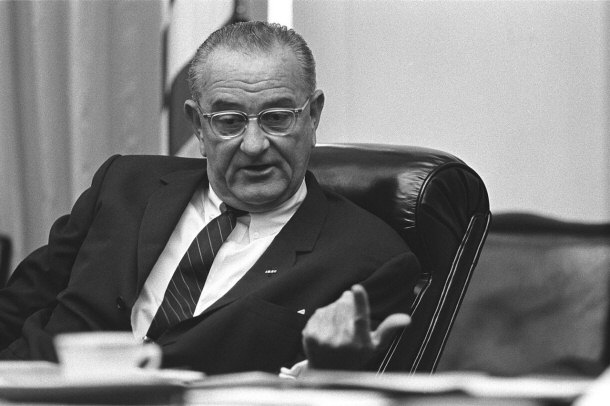
It was
not considered appropriate to discuss this outside of the office, and so
historians are only just now beginning to put together the pieces from journals
and letters. Apparently, he believed it would make people take him more
seriously. Abraham Lincoln, on the other hand, believed that it was important to
always be learning new and challenging skills. While that was not so unusual,
what was unusual was that he was a licensed bartender and remained one, keeping
up his license even when he became president.
5) Some
Household Names, Items, and the Like are Named Specifically for Presidents
Teddy Roosevelt one day refused to kill a small bear. As a joke, a toymaker
made a stuffed bear and gave it to him, calling it "Teddy's Bear." Teddy
Roosevelt loved it so much that he decided to keep it. Others also loved the
idea, and so they too began purchasing the bears.
Political Cartoon from 1902 depicting Roosevelt's Bear
Hunting Trip in Mississippi:
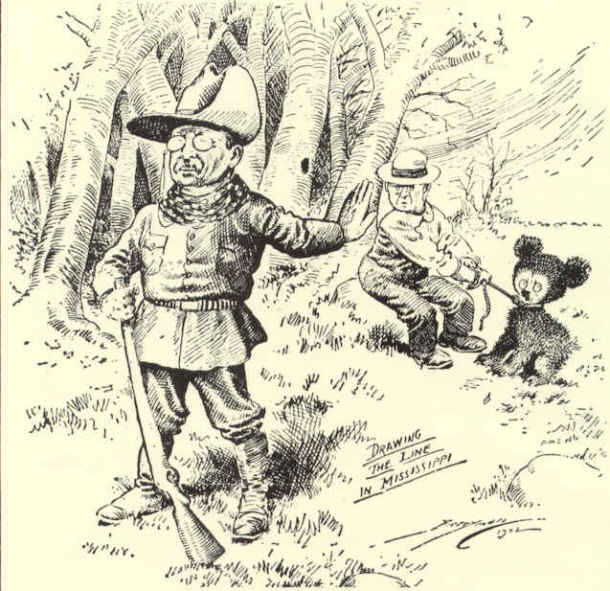
Most people who use the name
"Washington" in their product names do so in honor of George Washington, even if
they do not explicitly say so. Madison Baked Goods, a Virginia pastry brand, is
named for James Madison and his wife Dolly Madison. Though not named for the
president, the Baby Ruth Candy Bar was named for Grover Cleveland's daughter who
died when she was only 12.

4) The President Has Not Always Had a First Lady
|
Dolly Madison:
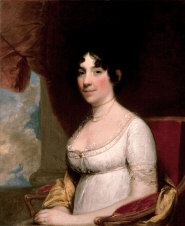
|
One of the more surprising facts is that the term "First Lady" did not
originate with Martha Washington. Instead, the term was one that did not
originate until 1849 when Dolly Madison, wife of James Madison, passed away.
President Zachary Taylor decided to honor her with the term "First Lady." It was
intended to be a compliment. The public liked the term greatly once it got out
and people started using it. It was first officially used to speak about a
president's wife in 1877 in reference to Lucy Ware Webb Hayes.
Surprisingly, the majority of first ladies
despised this label. Jackie Kennedy was the most open about her distaste in the
title. She felt that it demeaned the position and promoted sexist overtones.
However, all of the presidents' wives have responded to the title and refrained
from being coarse or rude when it has been used.
Additionally, not all of the presidents had wives while in office. James
Buchanan, for instance, never married. Presidents Tyler and Wilson were
widowers at the time they became president but then they remarried while they
were in the White House. However, they all had women in their lives who
fulfilled the services of hostess, whether she was a friend, sister, or
daughter.
3) Some Presidents Were Born as British Subjects
The Constitution states in Article II, section 1, paragraph 5 that “No
Person, except a natural born citizen, or a citizen of the United States, at the
time of the Adoption of this Constitution, shall be eligible to the Office of
President.” Some of our early presidents were born British subjects before
forming the United States of America. These Presidents are George Washington,
John Adams, Thomas Jefferson, James Madison, James Monroe, John Quincy Adams,
Andrew Jackson, and William Henry Harrison.
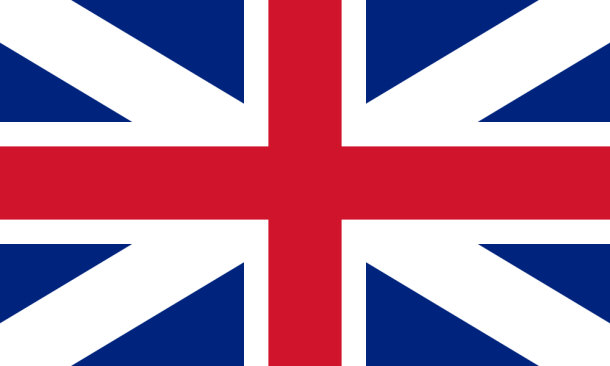
Since these presidents were elected,
no others have been born as subjects of any other nation.
2) Three Presidents Died on the Fourth of July
The Fourth of July is an important day for our nation. It is also a somber
day for those who honor the deaths of Presidents Adams, Jefferson, and Monroe.
All three of them died at some point on the Fourth of July.
Before his death, John Adams issued a warning for his fellow Americans. It
encouraged them to remember their past and to fight against abuse and injustice.
He knew that he was in poor health, but he decided that he was not then ready to
die.
John Adams:

Instead, he wanted to live at least until the fiftieth anniversary of the
Declaration of Independence. This he succeeded in doing. He died while his son
John Quincy Adams served as president on July 4, 1826.
Strangely enough on that same day, Jefferson also died. Like Adams, he too
published a letter reaffirming his beliefs in the Declaration of Independence.
This letter appeared in the National Intelligencer. However, shortly after this
on July 3, Jefferson fell sick with a heavy fever. He had to decline a party for
the celebration of the Declaration of Independence.
Thomas Jefferson:
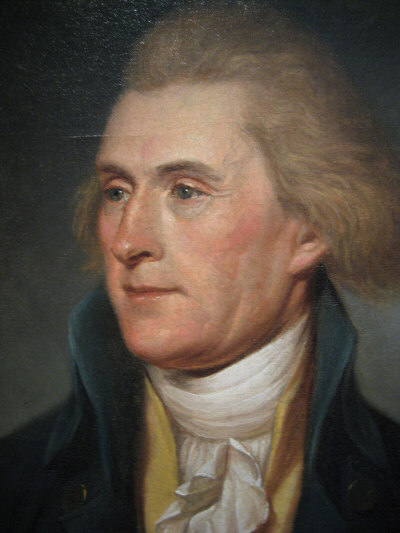
However, he determined that
he would not meet death fearfully. He walked into the garden with his grandson,
doctor, as well as other family members. He then gave a somber speech before
falling asleep and passing away.
James Monroe did not pass away on 1826. He lived for another five years,
though he missed his friends. In 1830, his beloved wife passed away. This sent
him into a great depression and his health, which had already been poor, started
to fail even more.
James Monroe:
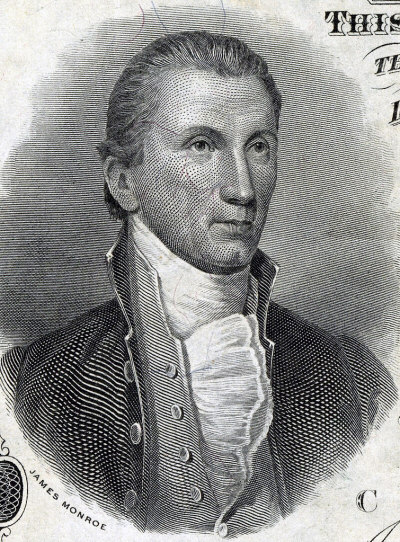
He moved in with his daughter Maria Hester Monroe. She cared
for him, and for a time, it seemed that he would recover. John Quincy Adams came to visit but found Monroe to be
eager to talk and alert. However, heart failure and tuberculosis finally claimed
Monroe.
1) Every President Has Been the Source of at Least One Presidential
Conspiracy Theory
All presidents have been the source for at least one presidential conspiracy
theory. While President Obama and the birther scandal is considered one of the
most modern famous presidential conspiracies, every other president has had at
least one.

Many of the more popular conspiracy theories involve the presidents being
involved with the opposite side of a conflict. For instance, George Washington
was accused of being a conspirator with the British. The conspiracy theory
relating to John Adams and his son John Quincy Adams was that the two of them
intended to institute a monarchy. Andrew Jackson supposedly intended to burn all
of the Catholics alive while at the same time planting sleeper agents throughout
the White House. Catherine Clinton goes into detail on the scandal and
conspiracy theories that surrounded Mrs. Lincoln in "Mrs. Lincoln: A Life." Her
greatest critics insisted that she was a Confederate spy. The fears were so
great that she could not even receive her own correspondences before security
agents went through them to ensure that she was not receiving or giving away
sensitive information. Presidents Roosevelt, Eisenhower, and Kennedy were all
claimed to be communists and socialists intent on infiltrating the government
and secretly running it behind the scenes.
History
Top Lists:
15 Biggest Architectural Blunders
Top 15 Most Horrifying Terrorist Attacks
15 Fascinating Facts About the Vietnam War
Top 15 Amazing Ancient Egyptian Architecture
20 Little Known Facts About the Titanic
Top 10 Most Creepiest Abandoned Places in the World
26 Interesting Facts About Henry Ford
List of 15 Tough Ancient Warriors Through History
List of 15 Notorious Roman Emperors and Empresses
Top 15 Worst Pandemics in History
15 Things That Remained the Same in the Past 100 Years
Top 15 Things China Invented First
Top 15 Greatest Inventors in History
15 Interesting Facts About Abraham Lincoln
10 Inventors Who Stole Their Ideas
15 Stories of Hilarious Medieval Victories
15 Detectives Credited With Solving The Biggest Cases In History
15 Fascinating Facts About the Ancient Pyramids
15 Inventions That Were the Result of a Mistake
15 Famous Stories of Execution
16 Rare Facts About the U.S. Presidency
15 Astonishing Leadership Stories that Ended up Successfully
Informational:
Analysis of the Linear B tablets and Wall Paintings
Aristophanes and Classical Greek Comedy
The First War of Scottish Independence
|